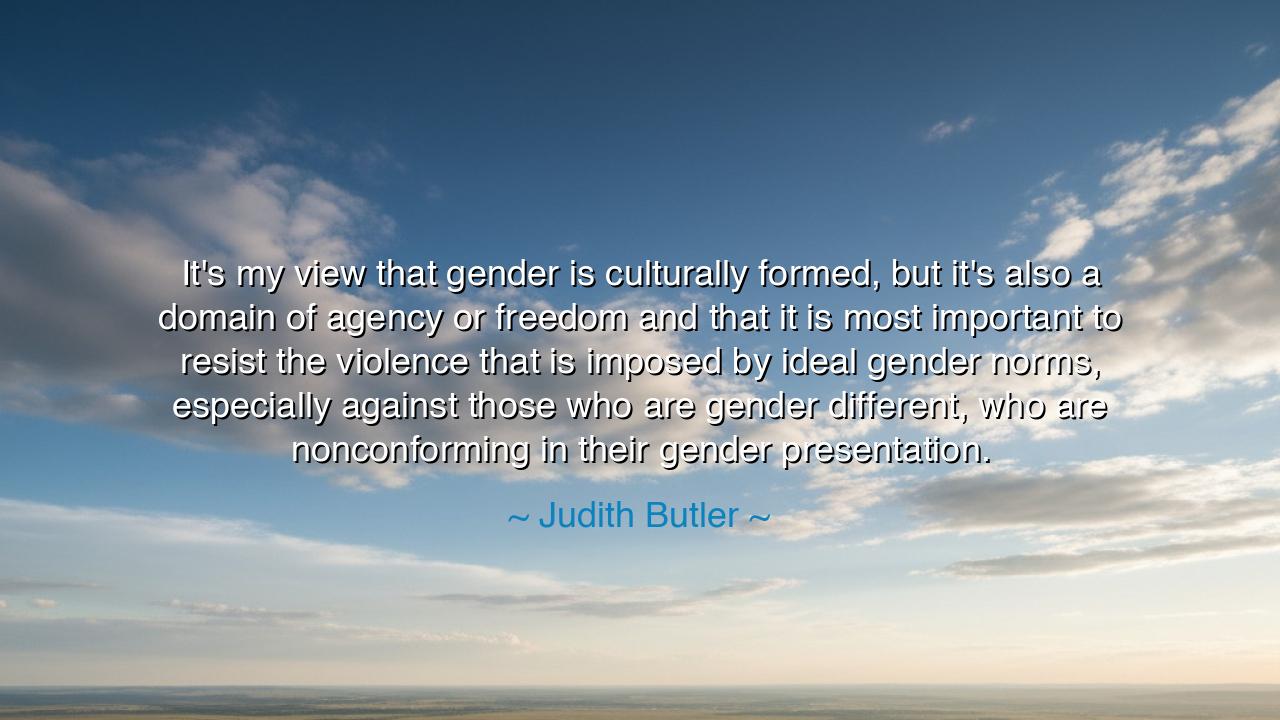
It's my view that gender is culturally formed, but it's also a
It's my view that gender is culturally formed, but it's also a domain of agency or freedom and that it is most important to resist the violence that is imposed by ideal gender norms, especially against those who are gender different, who are nonconforming in their gender presentation.






The gentle murmur of the café filled the air, blending with the rhythmic tapping of rain against the window. Jack sat across from Jeeny, his coffee cup cradled in his hands, his gaze drifting toward the rain-soaked streets. Jeeny, sitting opposite him, seemed lost in thought, her fingers lightly tracing the rim of her cup.
Host: After a brief pause, Jeeny spoke, her voice contemplative, with a touch of insight.
Jeeny: “I came across a quote from Judith Butler today that made me reflect on the complexities of gender. She said, ‘It’s my view that gender is culturally formed, but it’s also a domain of agency or freedom and that it is most important to resist the violence that is imposed by ideal gender norms, especially against those who are gender different, who are nonconforming in their gender presentation.’ What do you think she means by that? Do you think she’s challenging our ideas about gender and personal expression?”
Jack: He looked up, his expression thoughtful. “I think Butler is acknowledging the cultural aspects of gender—how it’s often defined and imposed by society—and at the same time, she’s emphasizing that gender is also a space of personal freedom and agency. We don’t just inherit gender roles passively; we also have the freedom to resist and redefine them. The second part of her quote is particularly striking because she’s addressing the violence that comes from rigid gender norms, especially when they target people who don’t conform to traditional expectations. She’s calling for a rejection of that violence and a recognition of the validity of nonconforming gender expressions.”
Jeeny: “Exactly. Gender, for Butler, isn’t just something that’s imposed on us—it’s something we actively engage with and have the power to shape. But, at the same time, we’re constantly navigating a system that enforces norms, and those norms can be violent in the way they exclude or punish people who don’t fit within them. Butler’s saying that we need to challenge these oppressive norms, particularly for those who express gender differently or nonconformingly. There’s a real sense of agency in her message, but also an urgent need for resistance against a system that harms those who deviate from the accepted gender norms.”
Host: The rain outside had softened, leaving a quiet stillness between them. Jack shifted slightly, his fingers still resting on his coffee cup as he continued.
Jack: “Right. I think Butler is inviting us to reconsider the freedom we have in expressing our gender, but also pointing out the social constraints that make it difficult or dangerous to do so. When she talks about resisting the violence of gender norms, she’s highlighting the ways in which society often uses these norms to control and police people’s identities. Gender, in her view, should be a space for exploration and expression, not a place where violence or exclusion is justified simply because someone’s expression doesn’t fit the mainstream model.”
Jeeny: “Yes, and I think that’s the power of Butler’s argument—it’s not just about how gender is shaped by culture, but also about the space we have to resist and transform it. Gender doesn’t have to be something we accept passively; we have the agency to question it and even reshape it in a way that’s more inclusive and freeing for everyone. It’s a call for freedom and liberation from the norms that restrict us, and a recognition of the dangers those norms pose to people who don’t conform.”
Host: The conversation seemed to deepen, as they both reflected on the power of gender as a space of both cultural definition and personal agency. Jack set his coffee cup down gently, his expression softening.
Jack: “Exactly. Butler is challenging us to see gender as fluid and dynamic, not as something fixed or inherently tied to specific roles. It’s a call to recognize that everyone has the right to express themselves freely, without fear of violence or marginalization. And the violence she refers to isn’t just physical—it’s the social and cultural punishment people face when they don’t adhere to prescribed gender roles. That’s where the real harm lies, and Butler’s urging us to resist it and create a space where gender can be a source of empowerment, not oppression.”
Jeeny: Her smile was small but filled with understanding. “Yes, and I think that’s the heart of what Butler is getting at—freedom through resistance. It’s about pushing back against the social forces that try to define and limit us, and finding the space to express ourselves authentically. In that way, gender becomes not just a societal construct, but a personal journey of self-discovery and expression.”
Host: The rain had stopped, leaving a calm stillness in the café. Inside, Jack and Jeeny sat in the realization that gender is not just a set of rigid roles—it is a dynamic field of personal expression and cultural negotiation. Judith Butler’s words remind us that we have the agency to resist the violence imposed by rigid gender norms and the freedom to redefine and express our own gender identities. It’s a call for liberation, inclusivity, and the recognition of the validity of nonconforming gender expressions in a world that is too often governed by narrow and harmful expectations.






AAdministratorAdministrator
Welcome, honored guests. Please leave a comment, we will respond soon